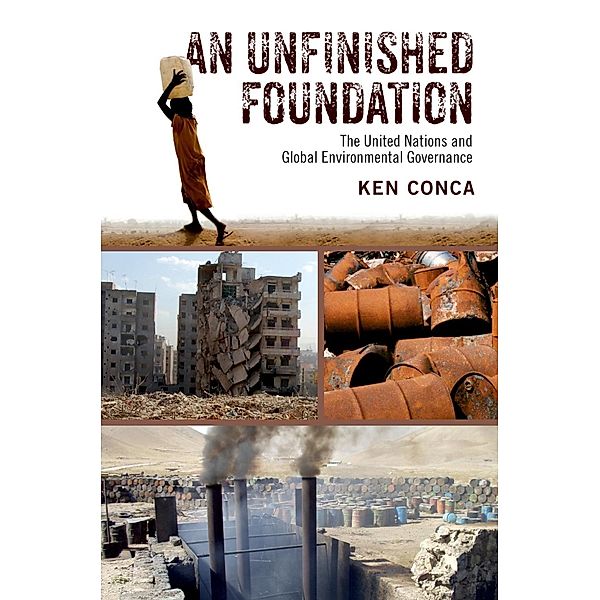An Unfinished Foundation (ePub)
The United Nations and Global Environmental Governance
(Sprache: Englisch)
Why is the United Nations not more effective on global environmental challenges? The UN Charter mandates the global organization to seek four noble aspirations: international peace and security, rule of law among nations, human rights for all people, and...
sofort als Download lieferbar
eBook (ePub)
38.49 €
19 DeutschlandCard Punkte
sammeln
- Lastschrift, Kreditkarte, Paypal, Rechnung
- Kostenloser tolino webreader
Produktdetails
Produktinformationen zu „An Unfinished Foundation (ePub)“
Why is the United Nations not more effective on global environmental challenges? The UN Charter mandates the global organization to seek four noble aspirations: international peace and security, rule of law among nations, human rights for all people, and social progress through development. On environmental issues, however, the UN has understood its charge much more narrowly: it works for "better law between nations" and "better development within them." This approach treats peace and human rights as unrelated to the world's environmental problems, despite a large body of evidence to the contrary.
In this path-breaking book, a leading scholar of global environmental governance critiques the UN's failure to use its mandates on human rights and peace as tools in its environmental work. The book traces the institutionalization and performance of the UN's "law and development" framework and the parallel silence on rights and peace. Despite some important gains, the traditional approach is failing for some of world's most pressing and contentious environmental challenges, and has lost most of the political momentum it once enjoyed. The disastrous "Rio+20" Summit laid this fact bare, as assembled governments failed to find meaningful agreement on any of the most pressing issues.
By not treating the environment as a human rights issue, the UN fails to mobilize powerful tools for accountability in the face of pollution and resource degradation. And by ignoring the conflict potential around natural resources and environmental protection efforts, the UN misses opportunities to transform the destructive cycle of violence and vulnerability around resource extraction.
The book traces the history of the UN's traditional approach, maps its increasingly apparent limits, and suggests needed reforms. Detailed case histories for each of the four mandate domains flag several promising initiatives, while identifying barriers to transformation. Its core implication: the UN's environmental efforts require not just a managerial reorganization but a conceptual revolution-one that brings to bear the full force of the organization's mandate. Peacebuilding, conflict sensitivity, rights-based frameworks, and accountability mechanisms can be used to enhance the UN's environmental effectiveness and legitimacy.
In this path-breaking book, a leading scholar of global environmental governance critiques the UN's failure to use its mandates on human rights and peace as tools in its environmental work. The book traces the institutionalization and performance of the UN's "law and development" framework and the parallel silence on rights and peace. Despite some important gains, the traditional approach is failing for some of world's most pressing and contentious environmental challenges, and has lost most of the political momentum it once enjoyed. The disastrous "Rio+20" Summit laid this fact bare, as assembled governments failed to find meaningful agreement on any of the most pressing issues.
By not treating the environment as a human rights issue, the UN fails to mobilize powerful tools for accountability in the face of pollution and resource degradation. And by ignoring the conflict potential around natural resources and environmental protection efforts, the UN misses opportunities to transform the destructive cycle of violence and vulnerability around resource extraction.
The book traces the history of the UN's traditional approach, maps its increasingly apparent limits, and suggests needed reforms. Detailed case histories for each of the four mandate domains flag several promising initiatives, while identifying barriers to transformation. Its core implication: the UN's environmental efforts require not just a managerial reorganization but a conceptual revolution-one that brings to bear the full force of the organization's mandate. Peacebuilding, conflict sensitivity, rights-based frameworks, and accountability mechanisms can be used to enhance the UN's environmental effectiveness and legitimacy.
Autoren-Porträt von Ken Conca
Ken Conca is Professor of International Relations in the School of International Service at American University.
Bibliographische Angaben
- Autor: Ken Conca
- 2015, 256 Seiten, Englisch
- Verlag: Oxford University Press
- ISBN-10: 0190232889
- ISBN-13: 9780190232887
- Erscheinungsdatum: 13.07.2015
Abhängig von Bildschirmgröße und eingestellter Schriftgröße kann die Seitenzahl auf Ihrem Lesegerät variieren.
eBook Informationen
- Dateiformat: ePub
- Größe: 2.15 MB
- Mit Kopierschutz
Sprache:
Englisch
Kopierschutz
Dieses eBook können Sie uneingeschränkt auf allen Geräten der tolino Familie lesen. Zum Lesen auf sonstigen eReadern und am PC benötigen Sie eine Adobe ID.
Kommentar zu "An Unfinished Foundation"
0 Gebrauchte Artikel zu „An Unfinished Foundation“
| Zustand | Preis | Porto | Zahlung | Verkäufer | Rating |
|---|





Schreiben Sie einen Kommentar zu "An Unfinished Foundation".
Kommentar verfassen